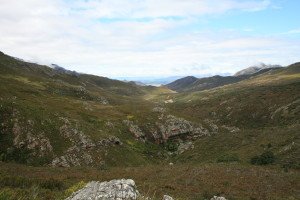Franschhoek 0
Driving up the Franschhoek Pass to the car park of the Mont Rochelle Nature Reserve, the views over the famous wine-producing valley are already spectacular, but once I had parked, I was more interested in the beautifully chirpy, melodic twittering loudly emanating from somewhere close by.
Dashing off, I found a Cape Grassbird prominently perched on some scrubby Restios and singing away in the early-morning sunshine. For me, it is one of the prettiest calls around and I felt doubly blessed to also have such a good, clear sighting of an impressive bird that can look quite dapper with its black stripes on rusty red and a long tail.
Usually, the Grassbird is skulking around in dense vegetation, but in the fynbos areas of the Western Cape, it apparently becomes quite territorial and brazen in its calling from prominent perches.
Mont Rochelle protects prime mountain fynbos and although there are not great numbers of birds to see, especially when the mists come over the mountain, there is much of interest.
A lovely little Karoo Prinia, another streaky bird with a long tail, was also spotted as the undulating trail became more wind-swept, while Yellow Bishop were buzzing around the Proteas in the drainage lines and Cape Canary were also easily spotted.
The pretty town of Franschhoek itself is, understandably when you consider the name means “French Corner”, full of alien vegetation, most notably the vineyards that produce the marvellous wine, but that does not mean the birding is bad.
Some of the beautiful gardens of the town host Swee Waxbill feeding on the grasses in Spring time (late September for this trip), while the impressive Malachite Sunbird can find lots of nectar sources in town.
There are alien vertebrates to go with the introduced vegetation, with Grey Squirrels reaching the northern-most limit of their range in Franschhoek, and enjoying all the big trees of the urban areas, while Mallards frequent the Franschhoek River alongside the bird they most often hybridise with, the Yellowbilled Duck.
Helmeted Guineafowl are the most common bird of the actual vineyards, although we now call them “Wine Turkeys”.
That’s because the charming English couple we met on their honeymoon saw we were birders while we were on the wine tram (a magnificent way to do a tour of the estates) and started telling us about all the “Wine Turkeys” they had seen during the trip!
Sightings list
Egyptian Goose
Hadeda Ibis
Reed Cormorant
Swee Waxbill
Grey Squirrel
Helmeted Guineafowl
Chacma Baboon
Rock Martin
Cape Grassbird
Karoo Prinia
Pied Crow
Yellow Bishop
Cape Canary
Mallard
Cape Bulbul
Blacksmith Plover
Yellowbilled Duck
Blackshouldered Kite
Whitethroated Swallow
Cape White-Eye
Malachite Sunbird
Redwinged Starling
Sacred Ibis

